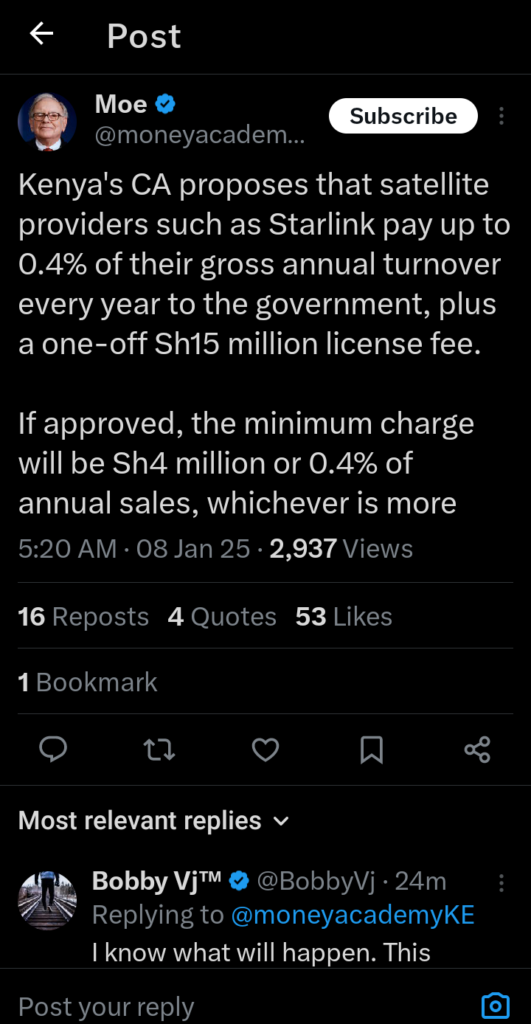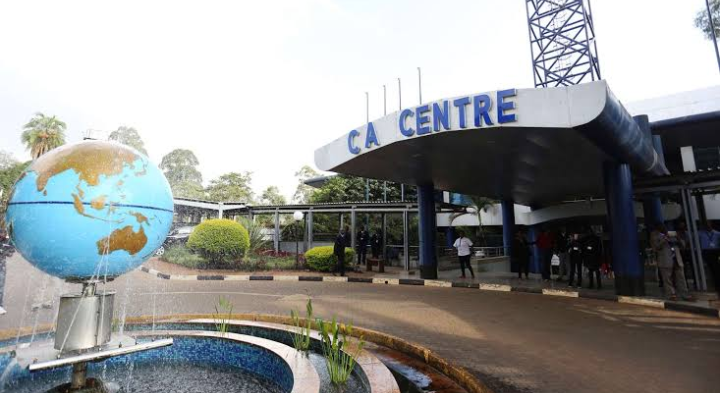Kenya’s Communications Authority (CA) has proposed new fees for satellite internet providers like Starlink.
These companies would need to pay up to 0.4% of their yearly earnings to the government.
Additionally, they would face a one-time license fee of 15 million Kenyan shillings.
If this plan is approved, the minimum payment would be 4 million shillings or 0.4% of annual sales, whichever amount is higher.
This proposal comes as satellite internet services are expanding in Kenya. Starlink, a service by Elon Musk’s SpaceX, began operating in Kenya in 2023.
It offers internet access in areas where traditional providers might not reach. However, local companies like Safaricom have raised concerns.
They worry that without proper regulations, these new services might not invest in the country, hire local workers, or follow Kenyan laws.
Safaricom has suggested that satellite providers should be required to partner with local firms to ensure compliance and investment in Kenya.
The CA’s proposal aims to create a fair playing field between satellite providers and local internet companies.
By introducing these fees, the CA hopes to encourage satellite companies to invest more in Kenya and contribute to the local economy.
The one-time license fee and the annual percentage of gross turnover are seen as ways to ensure that these companies participate fairly in the market.
However, there are concerns about how these fees might affect the cost of satellite internet services.
If companies like Starlink have to pay additional fees, they might increase their prices to cover these costs.
This could make satellite internet less affordable for consumers, especially in remote areas where it’s most needed.

Balancing the need for regulation with the goal of providing affordable internet access is a challenge that the CA will need to address.
It’s also important to consider how these proposed fees compare to regulations in other countries.
For instance, in Colombia, a significant economic presence framework imposes a 10% withholding tax on non-resident companies with substantial interactions in the market.
This tax applies to both goods and digital services, including cloud services.
Such international examples highlight the variety of approaches countries take to regulate foreign digital service providers.
The CA’s proposal is still under consideration, and it’s unclear when a final decision will be made.
Stakeholders, including satellite providers and local internet companies, will likely have opportunities to provide input before any regulations are finalized.
The outcome will have significant implications for the future of internet access in Kenya, particularly in rural and underserved areas.
The CA’s proposed fees for satellite internet providers represent an effort to regulate a rapidly growing sector and ensure fair competition in Kenya’s internet market.
While the intention is to encourage investment and compliance with local laws, careful consideration is needed to avoid unintended consequences, such as increased costs for consumers.
It will be important to balance regulatory goals with the need to expand affordable internet access across the country.





















Add Comment